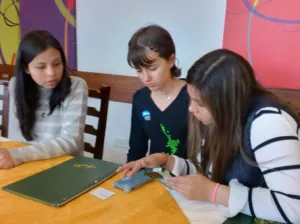AFS aims to provide 30% of our students with scholarships or grants
Find out about our range of scholarships, grants and fundraising
Find out about our range of scholarships, grants and fundraising
Family is the backbone of Bolivian society, and it is uncommon for children to leave home before they get married. For most Bolivian families. Sunday, (día de la familia) is family day, where members share experiences and stories over lunch or dinner. Teens are expected to follow their rules.
Bolivians tend to be relaxed about everything, especially time and punctuality. They are very open, friendly and welcoming so don’t be surprised if they express affection by hugging, kissing on the cheeks or saying hello to everyone they meet. Your friends will be your family’s friends since family is in the center of Bolivian life. Most Bolivian families and communities have strong religious ties, and can be considered conservative or traditionalist.
While the primary language in Bolivia is Spanish, most of the rural locals also speak their native tongues: Quechua, Aymara or Guaraní. AFS will provide an intensive Spanish course when you start your program, but having prior basic knowledge of Spanish will be an asset.

The school year starts in February and ends in November, running from Monday to Friday (8 am to 1 pm). You will probably wear a school uniform, and can expect a very formal relationship between students and teachers.

Food in Bolivia varies depending on the region. Food from the higher mountainous regions contain a lot of spices, whereas dishes in the lowlands and Amazonic region of Bolivia tend to be comprised of yucca, fish, vegetables and fruit. Typical Bolivian dishes include Papas Rellenas (deep fried balls of mashed potato stuffed with a boiled egg or cheese), salteñas (baked dough and filled with meat, vegetables, egg, olives and a slightly spicy sauce) and pique a lo macho (bite-sized pieces of beef, sausage, onions, spicy peppers, boiled egg and fries).

Discover the charm of Bolivia through the personal story of AFS alumni. Learn how her time abroad immersed her in the country’s unique customs, language, and way of life.
Read about Lucy’s experience